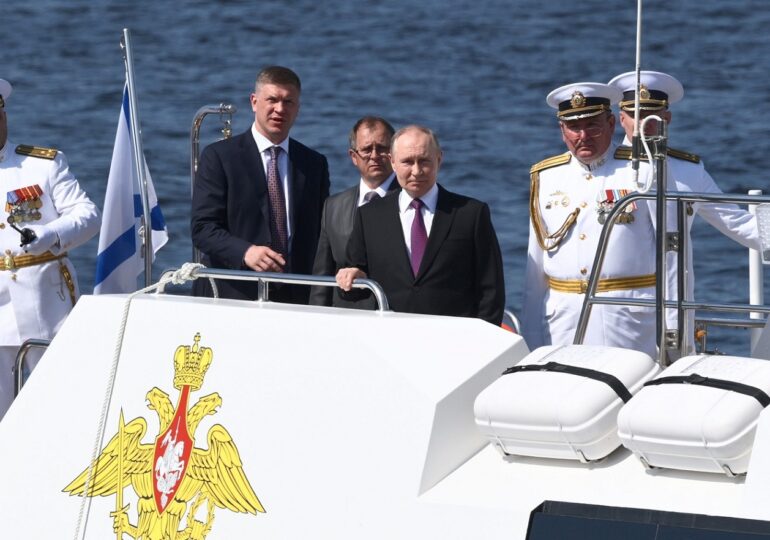Offended by the childish posts of former Russian President Dmitry Medvedev, Donald Trump ordered the relocation of two nuclear submarines near Russia. How will Moscow react?
The US President declared on Friday that he had ordered the positioning of two nuclear submarines in regions near Russia in response to threats made by former Russian President Dmitry Medvedev.
"Based on the extremely provocative statements of the former President of Russia, Dmitry Medvedev, who is currently the Vice President of the Security Council of the Russian Federation, I have ordered two nuclear submarines to be positioned in the corresponding regions, in case these foolish and inflammatory statements go beyond words. Words are very important and can often lead to unintended consequences, I hope this will not be one of those cases," wrote Donald Trump in a post on Truth Social.
He did not provide details about the submarines in question or the location where they will be repositioned.
After this escalation, are we on the path to a nuclear impasse between America and Russia? Can we speak of a specific reenactment of the internet era's Cuban missile crisis of 1962?
Hard to believe, judging by Russia's initial reaction, writes Steve Rosenberg, BBC correspondent in Moscow.
Moscow finds it amusing
Russian media institutions treated Trump's announcement disdainfully.
In a statement to the newspaper Moskovskii Komsomolets, a military commentator said that Trump "had a nervous breakdown."
A retiring lieutenant general told Kommersant that the US President's speeches about submarines are "meaningless threats." "He's just showing off," he added.
"I am sure Trump did not actually give any orders [regarding submarines]," suggested a Russian security expert for the same newspaper.
Kommersant also notes that Trump declared in 2017 that he had sent two nuclear submarines near the Korean Peninsula as a warning to North Korea. However, shortly after that, Trump met with North Korean leader Kim Jong Un.
Therefore, could Donald Trump's deployment of submarines be a precursor to a US-Russia summit in a bizarre way?
The British journalist, with extensive expertise in Russia, wouldn't go that far, but notes that the Russian authorities' reaction was interesting - that is, there has been none so far. Neither from the Kremlin, nor from the Russian Foreign Ministry, nor from the Ministry of Defense.
A possible strategy of Trump
Trump had been arguing with Medvedev on social media for a few days. After the US President reduced Russia's deadline of 50 days to end the war in Ukraine to less than two weeks, Medvedev wrote that Trump "is playing the ultimatum game with Russia. Each new ultimatum is a threat and a step towards war."
Trump replied: "Tell Medvedev, the failed former Russian president who thinks he's still in power, to watch what he says. He's entering very dangerous territory."
Medvedev's next post contained a reference to the "Dead Hand," the automatic nuclear response system developed in the Soviet Union.
Obviously, this was not well received by the White House.
When he was the President of Russia, between 2008 and 2012, Medvedev was seen as a relatively liberal figure.
"Freedom is better than the lack of freedom," is one of his statements from that period.
But Putin's man has become increasingly aggressive. Since Russia's full invasion of Ukraine, he has gained a reputation for bombastic and anti-Western social media posts. Most have been tolerated as he is not considered the voice of the Kremlin.
All of a sudden, Medvedev has caught the attention of the President of the United States. Moreover, he has directly engaged with Trump.
It's one thing not to like a social media post. We've all been through that. But disliking it so much that you deploy nuclear submarines seems like an exaggeration, notes Rosenberg.
So why did Trump do it?
We can refer to Trump's own explanation in his interview with Newsmax: "Medvedev said some very bad things, talking about nuclear weapons. When you mention the word nuclear, my eyes light up, and I say we should be careful because it is the ultimate threat."
But Medvedev has been making nuclear attack threats for a long time through social media. There is nothing new.
What is clear is that Trump took Medvedev's recent posts very personally and reacted accordingly.
Could there also be a strategy at play? Unpredictability seems to be an important part of Trump's way of acting in business and politics; he can make unexpected decisions to unsettle his rivals and adversaries before or during negotiations.
For example, negotiations to end the war in Ukraine. Surprise submarine deployments could fall into this category, concludes the British journalist.
T.D.

